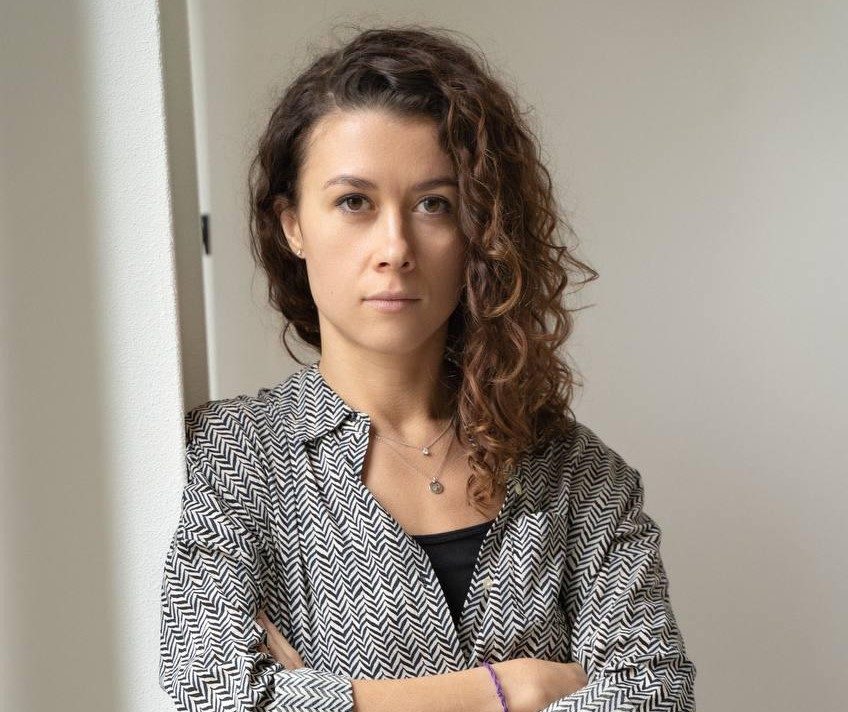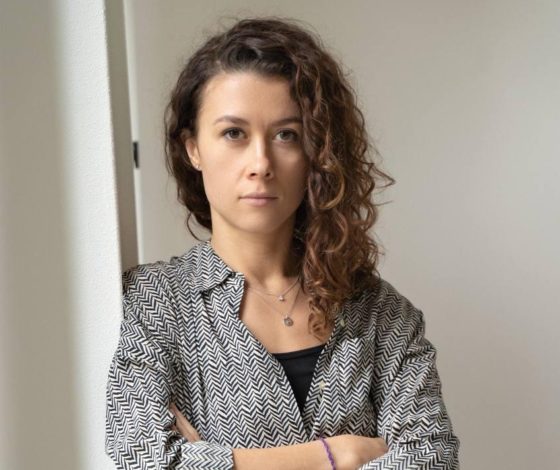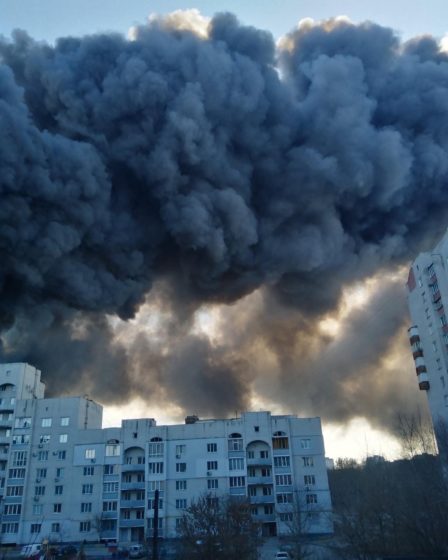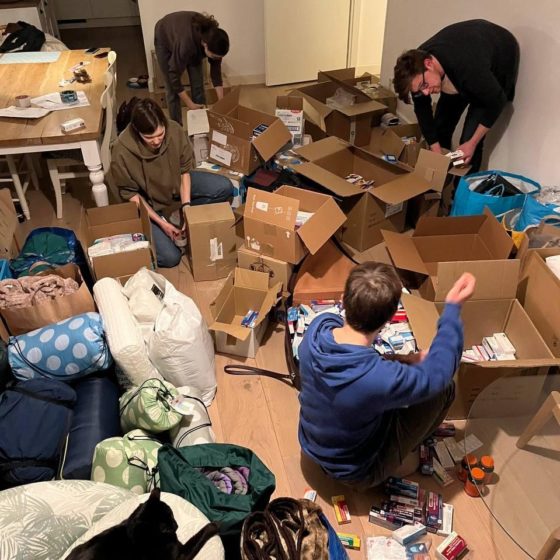The Ukrainian set on saving her family – ‘I have realised that nothing is impossible.’


Ukrainian national Anna Bilenka (31), a writer from Haarlem, moved to the Netherlands in 2014 when her partner was offered a job here. With family in some of the most dangerous parts of Ukraine, she has seen the invasion of her home country as a call to action and has found herself doing everything from securing morphine prescriptions for injured soldiers to meeting with Mark Rutte at the Catshuis. Here’s her story and how to help.
‘The last time I was in Ukraine was this summer. I was doing a two-month book tour for my debut novel. It had sold out in just three months. The novel’s central three characters are Dutch, Ukrainian and Syrian. I interviewed over 200 people as part of my research. Two years ago, when I talked to my friends from Syria to gather information about the war there, I could never have imagined that one day it would be them sending me messages asking how my family are during the war with Russia.
When I was in Ukraine in the summer, everything was very welcoming. It felt like the whole world was supporting me with my book release and the events surrounding it. That’s typical of my land: it always gives me so much energy to move forward.

Invasion
But the situation changed in September when we started to notice more and more Russian troops next to the Belarusian border. We started to beg our parents to move from Chernihiv to the western part of Ukraine to live with relatives, but no one believed the war would happen because it would cost too much money and it would be a complete disaster for Russia. On February 24, we woke up with this terrible call and since then it feels like it’s been years already.
We called my parents at 7am. They packed up the car and my dad took my sister, my cousin and my sick grandfather and they tried to flee. But when they approached the bridge to leave, Ukrainian soldiers told them that it was not safe as it had been mined already and so they returned home. They tried again later, desperate to reunite with my mother who lives with her sick father. But two hours later that bridge did not exist any more.
Fleeing the capital
My brother was in Kyiv without a car and the train station was full. The Russians were attacking from the sky and there were explosions. Civilians died. People saw tanks from their balconies. The bombs were close to the building where my brother lived. He and his fiancée got engaged just 10 days before the war. A friend of mine gave them her own car to escape. There wasn’t much petrol in it, and they needed to collect keys and papers first. They somehow managed to call a taxi to reach it! A taxi? Can you imagine?
They are now in the western part of the Ukraine where he says it is quiet enough to sleep. They had a shower and warm food, which they could not have in the basements or underground carparks they were hiding in. Everything is so simple when it’s about life. But no men aged 18-60 are allowed to cross the border, even if they have a disability, like my father and my brother. There’s this saying in Ukraine: women to the west, men to the east. But still, people who cannot fight are stopping tanks with bare hands begging them not to enter their towns. Everyone is trying to do what they can.
I just heard that my sister has managed to flee Chernihiv. It’s a miracle. It felt like the whole of Europe was helping her find a car! She was working abroad but went back to the Ukraine a month ago in between jobs and got stuck. She has a PhD in Microbiology and hopes to come to the Netherlands.

Action
My day does not start with coffee any more. I wake up and immediately check the news in my home town to see how much damage was done in the night. I then gather all my power to call my family. If there’s no answer, I don’t know if they are dead or are just sheltering in the basement. My body trembles every time I talk to them.
When I know they are safe, I can concentrate. I gather humanitarian aid at my house – everyone knows our address now! – and collaborate with people who need something, and with journalists to spread information. I even managed to get morphine prescriptions for Ukrainian soldiers! I have realised that nothing is impossible. I can find anything, anywhere, in any amount.
I saw on a website, that the International Criminal Court has started to gather evidence from everyday people. My father and sister have been recording everything they can. Before the war, I was such a self-doubting person and didn’t want to trouble anyone for favours. Right now, I don’t even knock at the door! I open the door, and I say who I am and what I need. And if they can’t help me, I ask them to connect me with someone who can.
Until my family are safe, I’ll use all my energy, all my knowledge and all my skills to help them. I feel ashamed that I cannot do more because every second my family is trying to survive. The same day I went to Albert Heijn to buy food, my father told me he had a piece of bread and an onion for dinner.
Lunch at the Catshuis and dinner at home
Last week, I got a call from an unknown number, inviting me to be part of a small group of Ukrainians speaking to Prime Minister Mark Rutte about what help is needed. Even now, while I’m talking about it, I can’t believe it. He’s talking to me, he’s calling me Anna, and he’s asking me about my family…! We spoke for two hours, during which his advisor already shared some messages and things started to move. The Netherlands was one of the first countries to provide financial and military support and we are really thankful. This week, I am also meeting with Femke Halsema, the mayor of Amsterdam.
Op het Catshuis sprak ik zojuist met een aantal Oekraïners die in Nederland wonen. Zij maken zich grote zorgen om hun familie en vrienden en om hun land. Hun persoonlijke verhalen raken mij diep. Ze bevestigen eens te meer hoe afschuwelijk de situatie in Oekraïne is. pic.twitter.com/HG3nVh5PRy
— Mark Rutte (@MinPres) March 4, 2022
Some people ask how they can help. Every action makes a difference. Do whatever you do best. Maybe you have connections with hospitals, are a therapist, are good with children, can cook, or can provide legal advice? The refugees don’t want to stay here, believe me. They just want calm.
A couple of days ago, a friend of ours came to our place and cooked us dinner. For the first time in this period of war, we had a normal dinner and for 30 minutes we sat together not checking the news and we had some warm food and we felt normal. That was an enormous help on an emotional level. I calmed down and I had more energy to continue the fight.
A new network
I speak Dutch, but until recently had very little network here. That’s all changed, obviously! Since the invasion, so many people have helped us. Everyone is so nice to us. I’m so grateful. Some people brought flowers. A stranger brought me soup. Others offered their spare rooms to my family or friends. My network is now so Dutch. For the first time in seven years, I feel like I’m visible – the whole of Ukraine does – and that’s because Dutch people are caring so much for me right now.
I run an international book club in the Netherlands. I’ve had so much help from the members, Russians included, and I’m so lucky I have those people in my network. I have no room for hate any more. On day two, I saw a video of the house where I grew up burning. I couldn’t even cry. There was so much anger inside. But now I prefer to use that energy to help. Now, there is only hope and the thought that anything is possible.’
You can find more information about how you can help Ukrainians like Anna Bilenka and her family here.
Anna was talking to Deborah Nicholls-Lee
Thank you for donating to DutchNews.nl.
We could not provide the Dutch News service, and keep it free of charge, without the generous support of our readers. Your donations allow us to report on issues you tell us matter, and provide you with a summary of the most important Dutch news each day.
Make a donation